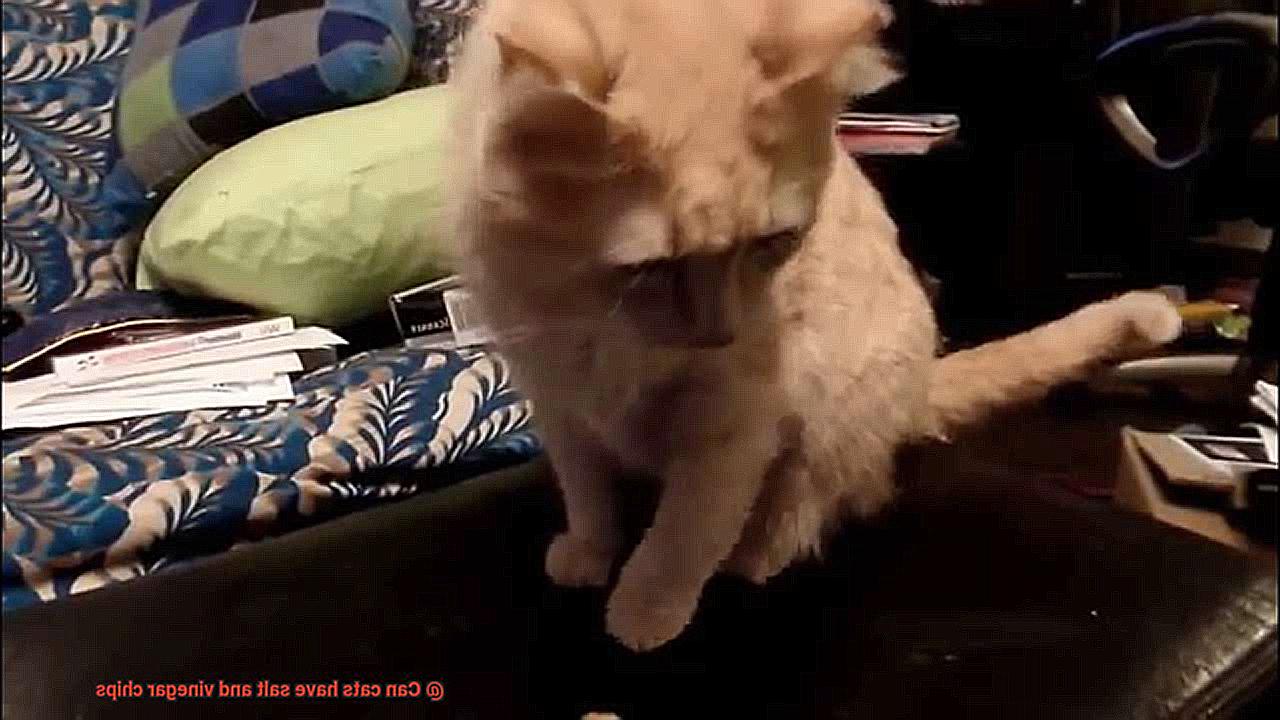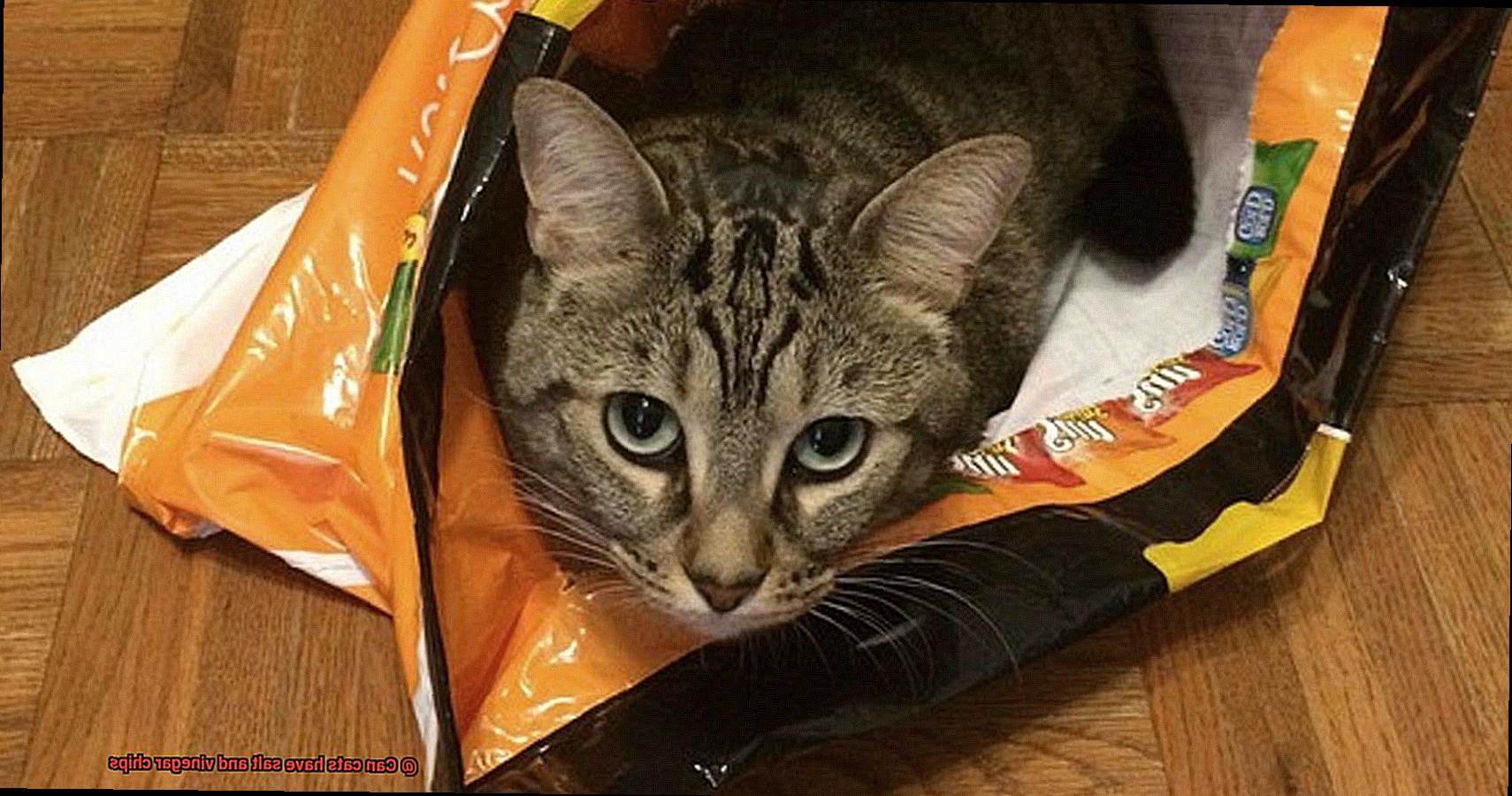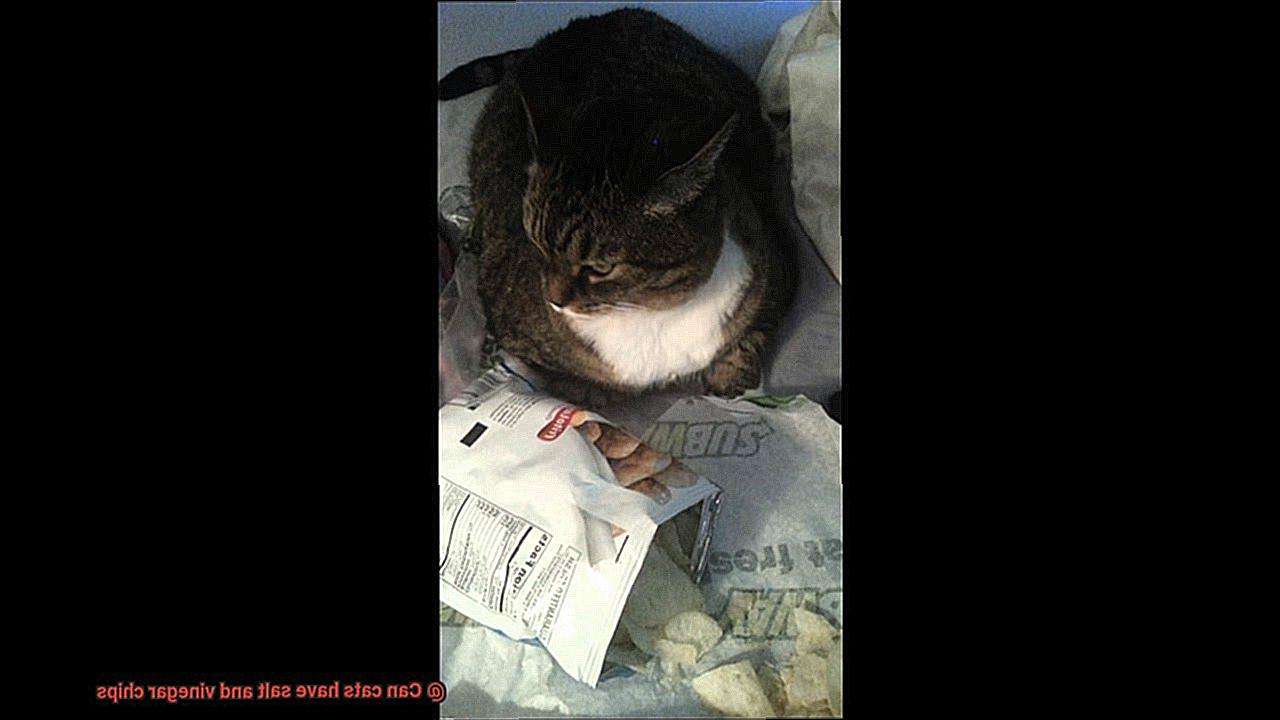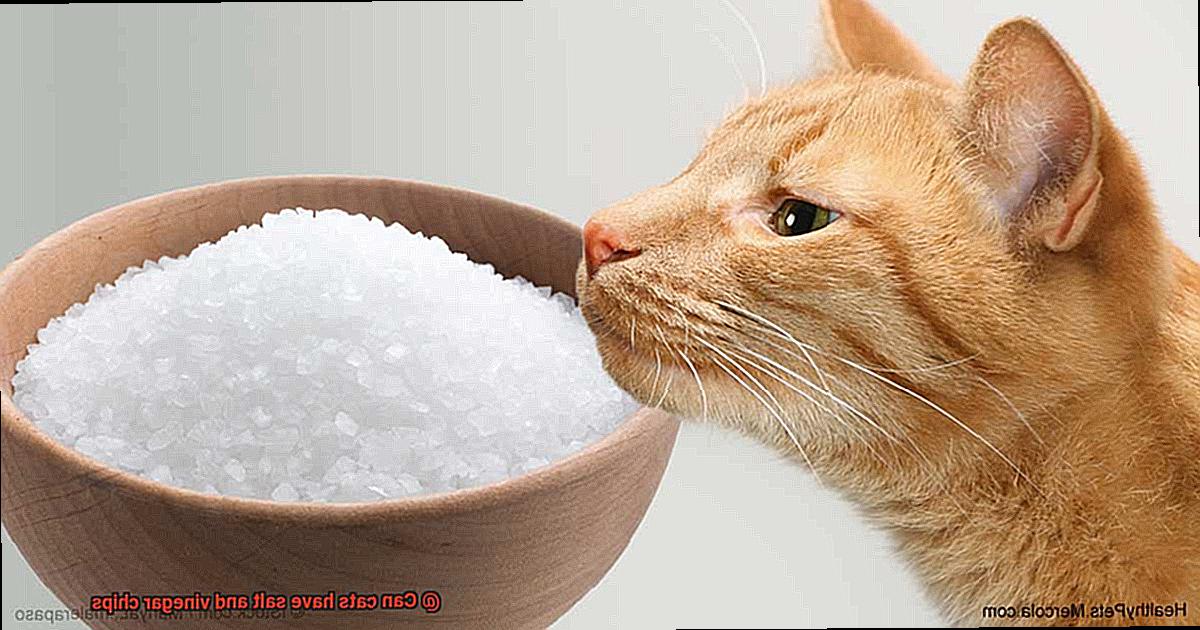As a devoted pet parent, it’s natural to be curious about what your furry friend can and cannot eat. And if you’re a chip lover, you may wonder if it’s okay to share your salt and vinegar chips with your feline companion. After all, cats have an insatiable interest in whatever we consume.
Salt and vinegar chips are a human favorite, but can they be enjoyed by our feline friends? The answer is a resounding no. While offering your cat a taste of your chip might seem harmless, there are specific ingredients in salt and vinegar chips that can jeopardize their well-being.
In this blog post, we will explore why salt and vinegar chips are not the best food choice for cats. We’ll delve into the potential health hazards these chips pose to our feline friends, such as sodium poisoning and digestive issues. Additionally, we’ll provide safe snack alternatives that are both nutritious and delectable for cats.
So if you’re a cat parent who loves munching on these tangy treats, read on to discover why it’s advisable to keep them out of your cat’s diet.
Can Cats Have Salt and Vinegar Chips?
Sadly, the answer is a resounding no. Though we humans may enjoy snacking on these tangy delights, they are not suitable for our furry friends.
Why, you ask? Well, for starters, salt and vinegar chips are loaded with sodium and artificial flavorings that can wreak havoc on your cat’s health. Excessive sodium intake can lead to dehydration and kidney damage, while the acidic vinegar can irritate your cat’s sensitive stomach and cause digestive upset.
Another crucial point to remember is that cats are obligate carnivores. This means that their diet should consist mainly of animal protein, and snacks like salt and vinegar chips add zero nutritional value to their diet. In fact, indulging your cat with human snacks can lead to obesity and other health issues down the line.
But the risks don’t stop there. Feeding your cat salty or acidic foods can also alter their taste preferences and make them shun their regular food in favor of unhealthy treats. We don’t want that, do we?
Instead of risking your cat’s health and happiness by sharing your snacks with them, it’s best to stick to high-quality cat food that meets their specific nutritional needs. If you’re keen to give them a treat, there are plenty of cat-specific options available in pet stores. You could also offer them small amounts of cooked meat or fish (sans bones or skin) as a special treat.
To sum up, feeding your cat salt and vinegar chips is a big no-no. Opting for a balanced diet that meets their nutritional requirements is essential for their well-being. And if you ever have any doubts or concerns about your kitty’s diet or health, don’t hesitate to consult with your veterinarian.

The Risks of Feeding Salt and Vinegar Chips to Cats
But when it comes to salt and vinegar chips, it’s important to know that this popular human snack can be quite dangerous for cats.
Firstly, these chips are packed with sodium, which can be harmful to your cat’s digestive system. While humans can tolerate high levels of sodium, cats are not equipped to handle excessive amounts. Feeding your cat these chips can lead to dehydration and elevated sodium levels in their blood, which can make them very sick and even require hospitalization.
In addition to the high sodium content, the acidic nature of vinegar can also cause stomach irritation in cats, leading to vomiting or diarrhea. This can cause discomfort for your pet and may lead to long-term health problems if not addressed.
But it’s not just the salt and vinegar that pose a risk to your cat’s health. The ingredients used in these chips, such as onion powder and garlic powder, belong to the Allium family and can be toxic to cats. These ingredients can damage a cat’s red blood cells, leading to anemia, which is especially dangerous for cats with underlying health issues or compromised immune systems.
As responsible cat owners, we have a duty to provide our pets with proper nutrition and care. While it may be tempting to share a snack with your cat, it’s important to remember that not all foods are safe for them. A balanced diet of high-quality cat food and treats specifically designed for feline nutrition is always the best choice.
Other Human Foods that are Unsafe for Cats
However, it’s important to note that not all human foods are safe for cats. Even some foods that are considered safe for humans can be toxic and even deadly to our feline companions.
One of the most dangerous human foods for cats is chocolate. This delectable treat contains a compound called theobromine that is difficult for cats to metabolize, leading to vomiting, diarrhea, seizures, and even death in severe cases. So, if you’re tempted to indulge in some chocolate, make sure to keep it far away from your cat and opt for a cat-friendly treat instead.
Garlic and onions are also harmful to cats. These ingredients contain compounds that can damage a cat’s red blood cells, which can lead to anemia. Grapes, raisins, avocados, alcohol, caffeine, and dairy products should also be avoided as they are toxic to cats.

But it’s not just toxic foods that you need to be careful about. Some human foods may not be toxic but can still cause digestive upset in cats. Spicy foods can irritate a cat’s digestive system and cause diarrhea or vomiting. High-fat foods like bacon or sausage can also lead to gastrointestinal issues and even pancreatitis in some cats.

So, what should you feed your cat? Stick to a balanced diet specifically formulated for your cat’s nutritional needs. This means feeding them high-quality cat food and treats that cater to their dietary requirements. If you’re unsure about what to feed your cat or have any questions about their diet, consult with your veterinarian.
Healthy Snacks for Your Cat
While it may be tempting to share your favorite snacks with your cat, remember that not all human foods are safe for them- especially salt and vinegar chips.
These chips may be tasty for us, but they can be harmful to cats. The high sodium content in salt and vinegar chips can lead to dehydration and negatively affect your cat’s kidneys. Additionally, the acidic nature of vinegar can upset their stomach, resulting in vomiting or diarrhea.
It’s crucial to note that cats have unique digestive systems that differ from humans. Therefore, it’s essential to consider their specific nutritional needs before offering them any snacks.
So what are some healthy snack options for cats? Opt for small amounts of cooked chicken or fish, plain yoghurt, or fruits such as watermelon or blueberries. These snacks are packed with protein, vitamins, and antioxidants that can help keep your cat healthy and happy.

However, it’s important to remember that moderation is key. Overfeeding snacks or treats can lead to obesity and other health issues. Always consult with your veterinarian before introducing new foods to your cat’s diet.
What to Do if Your Cat Eats Salt and Vinegar Chips
Cats are curious creatures and will sometimes eat things they shouldn’t, such as salt and vinegar chips. These chips are high in sodium, which can be harmful to cats in large quantities. So, what should you do if your cat eats salt and vinegar chips? Here are some steps to follow:
Recognize the Signs of Salt Poisoning
The first step is to be aware of the signs of salt poisoning. Keep an eye out for symptoms such as increased thirst, vomiting, diarrhea, and seizures. If your cat exhibits any of these symptoms, it’s crucial to contact your veterinarian right away.
Seek Professional Help

If your cat has ingested salt and vinegar chips, it’s essential to take action quickly. Contacting your veterinarian as soon as possible is the best course of action. They may recommend bringing your cat in for an examination or providing home care instructions. In some cases, they may suggest inducing vomiting to remove the chips from your cat’s system.
Prevent Future Incidents
Prevention is key when it comes to your cat eating harmful foods. To prevent your cat from eating salt and vinegar chips in the future, take steps to keep snacks and other foods out of reach.
Store food in secure containers and make sure your cat cannot access them. Consider providing your cat with healthy treats specifically designed for felines – this will not only keep them safe but also provide them with proper nutrition.
Monitor Your Cat’s Health
After ingesting salt and vinegar chips, it’s important to monitor your cat closely for any signs of distress or illness. Pay attention to any signs of digestive distress such as vomiting, diarrhea, or lethargy.
If your cat experiences any of these symptoms, it’s essential to contact your veterinarian right away.
Offer Fresh Water
Offering fresh water can help flush out any excess salt from your cat’s system and prevent dehydration. Encouraging them to drink more water can also help prevent future incidents of salt poisoning.
Remember that cats have different nutritional needs than humans, so it’s essential to provide them with a balanced diet that meets their unique needs.
Conclusion
As a responsible pet parent, it’s crucial to be aware of what we feed our furry companions. Sharing our favorite snacks with them may seem like a loving gesture, but it can have negative impacts on their health. In this article, we’ve learned that salt and vinegar chips are not suitable for cats due to their high sodium content, acidic nature, and harmful ingredients.
To keep your cat healthy and happy, it’s vital to provide them with a balanced diet that meets their nutritional needs. Instead of offering human treats, consider cat-specific options or small amounts of cooked meat or fish (without bones or skin).
Remember that not all human foods are safe for cats. Foods such as chocolate, garlic, onions, grapes, raisins, avocados, alcohol, caffeine, and dairy products should be avoided as they can be toxic or cause digestive issues.
If your cat accidentally ingests salt and vinegar chips or any other harmful food item, seek professional help immediately. Monitor your feline friend closely for signs of distress or illness and offer fresh water to prevent dehydration.
In summary, by being mindful of what we feed our cats and seeking professional advice when necessary, we can ensure that they live happy and healthy lives alongside us.







